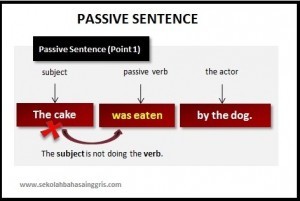Materi Belajar Kalimat Pasif-Aktif Bahasa Inggris+Contoh Kalimat
Sekolahbahasainggris– Apakah kalian kesulitan dalam merubah kalimat aktif menjadi kalimat pasif dalam bahasa Inggris? Jika iya, Yuk disimak materi pembelajaran bahasa Inggris berikut ini:

Passive Sentences
Use of Passive
Passive voice is used when the focus is on the action. It is not important or not known, however, who or what is performing the action. Sometimes a statement in passive is more polite than active voice
Form of Passive
Subject + to be + Past Participle (V3)
Example: A letter was written.
When rewriting active sentences in passive voice, note the following:
- the object of the active sentence becomes the subject of the passive sentence
- the finite form of the verb is changed (to be + past participle)
- the subject of the active sentence becomes the object of the passive sentence (or is dropped)
- Passive Sentences with Two Objects
Rewriting an active sentence with two objects in passive voice means that one of the two objects becomes the subject, the other one remains an object. Which object to transform into a subject depends on what you want to put the focus on.
| Subject | Verb | Object 1 | Object 2 | |
| Active: | Rita | wrote | a letter | to me. |
| Passive: | A letter | was written | to me | by Rita. |
| Passive: | I | was written | a letter | by Rita. |
.
As you can see in the examples, adding by Rita does not sound very elegant. That’s why it is usually dropped.
- Personal and Impersonal Passive
Personal Passive simply means that the object of the active sentence becomes the subject of the passive sentence. So every verb that needs an object (transitive verb) can form a personal passive. Example: They build houses. – Houses are built.
Verbs without an object (intransitive verb) normally cannot form a personal passive sentence (as there is no object that can become the subject of the passive sentence). If you want to use an intransitive verb in passive voice, you need an impersonal construction – therefore this passive is called Impersonal Passive. Example: he says – it is said
Impersonal Passive is not as common in English as in some other languages (e.g. German, Latin). In English, Impersonal Passive is only possible with verbs of perception (e. g. say, think, know). Example: They say that women live longer than men. – It is said that women live longer than men.
Although Impersonal Passive is possible here, Personal Passive is more common. Example: They say that women live longer than men. – Women are said to live longer than men.
The subject of the subordinate clause (women) goes to the beginning of the sentence; the verb of perception is put into passive voice. The rest of the sentence is added using an infinitive construction with ‘to’ (certain auxiliary verbs and that are dropped).
Sometimes the term Personal Passive is used in English lessons if the indirect object of an active sentence is to become the subject of the passive sentence.
- Active Sentences and Passive Sentences
When we use an active verb, we say what the subject does. When we use a passive verb so we say what happens to the subject.
Form of all passive verbs : Be + Past participle
The passive is be (is/was)+ past participle.
BE can be in any of its forms : am ,is ,are ,was ,were ,has been ,have been ,will be , etc . The past participle follows BE. for regular verbs , the past participle ends in (ed ) example : mailed , helped ,corrected . Some past participle are irregular , example : sent , written , read .
Example : a) Yudi sent the letter
- b) The letter was sent by Yudi
This sentences A and B have the same meaning. The object of an active sentence becomes the subject of a passive sentence . And in a passive sentence (b) after the verb following “ by- phrase” .
- Tense Forms Of Passive Verbs
Simple Present : Active : The news surprises me
Passive : I am surprised by the news .
Simple Past : Active : The news surprises me
Passive : I was surprised by the news.
Present Perfect : Active : Yudi has mailed the letter
Passive : The letter has been mailed by Yudi.
Future : Active : Tika wiil mail the letter
Passive : The letter will be mailed by Tika
Semoga Bermanfaat Para Pembaca SBI!!!
Baca Juga:
